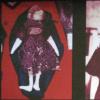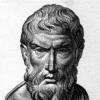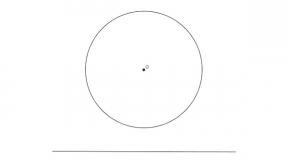Conclusion I remember a wonderful moment. Analysis of the poem by A.S. Pushkin “I remember a wonderful moment... You might be interested
“I remember a wonderful moment...” - one of the most touching and tender poems about love written by A. S. Pushkin. This work is rightfully included in the “Golden Fund” of Russian literature. We offer you to review the analysis of “I remember a wonderful moment...” according to plan. This analysis can be used in a literature lesson in 8th grade.
Brief Analysis
History of creation- poems written in 1825 and dedicated to A.P. Kern. Published in the almanac “Northern Flowers” in 1827.
Theme of the poem- poems about unrequited love, which nevertheless saves a person, elevates his soul and fills life with meaning.
Composition– The poem consists of three conventional parts. the first part is nostalgic, where the hero yearns for his beloved, the second describes the hero’s feeling of loneliness and suffering, the third brings the hero back to life, saving him from despair by the newly resurrected feeling of love.
Genre– love letter
Poetic size– iambic pentameter with cross rhyme ABAB.
Metaphors- “the rebellious gust of storms scattered former dreams”
Epithets- “heavenly features”, “hopeless sadness”, “wonderful moment”.
Comparisons- “like a fleeting vision, like a genius of pure beauty.”
History of creation
The history of the creation of the poem is directly related to the person to whom this sincere declaration of love is dedicated. Pushkin dedicated his poems to Anna Petrovna Kern, a married woman who captivated the poet’s heart with her deep and restrained beauty as soon as they met her at a social reception in 1819.
True, the poem was written only a few years after they met - in 1825, when Pushkin again met the captivating beauty of St. Petersburg in the Trigorskoye estate, which was located next to the poet’s native estate - Mikhailovsky - where Alexander Sergeevich was serving his exile. There, he finally confessed his feelings to Anna, and she reciprocated Pushkin.
It is possible that Kern was primarily interested in Pushkin as a young poet and therefore the attention of a celebrity pleased her vanity. One way or another, it was not only Pushkin who courted Anna Petrovna, which aroused burning jealousy in the latter, which always became the cause of scandals between lovers.
Another quarrel put an end to the love relationship between Pushkin and Kern, but still the poet dedicated several wonderful poems to her, among which “I remember a wonderful moment...” occupies a special place. Pushkin’s lyceum friend Delvig published it in the almanac “Northern Flowers” in 1827.
Subject
Pushkin chose the description of the feeling of unrequited love as the main problem of the poem.
The poem contains the whole range of emotions, the evolution of which is simple: at first the lyrical hero experiences love languor, in his imagination again and again resurrecting the image of his beloved. But gradually the feelings that did not find a response in the beloved’s soul faded away. And the lyrical hero again plunges into a boring and gray world: in this everyday life, his soul seems to die.
But now, after a while, the hero meets her again, his beloved. And the forgotten feeling of love is resurrected, filling the soul and heart of the poet with the fullness of life sensations. Only in love does Pushkin see meaning; only love, in his opinion, can relieve despair and pain, and make a person feel alive again. Love resurrects to life - this is the main idea of the work.
Composition
The composition of the poem conventionally consists of three parts. In the first, the mood of the lyrical hero is nostalgic. He returns again and again in his memories to meeting and getting to know a beautiful woman.
The lyrical hero dreams of “cute features” for a long time and hears her “tender voice.” Then Pushkin describes the dark days of his “imprisonment” in the wilderness. He admits that the loneliness of exile deprived him of even inspiration, and life, once full of vivid emotions, turned into existence.
In the third part of the poem, the lyrical hero again feels the joy of life, since a meeting with a forgotten beloved revives love in his heart, and with it inspiration, passion, and the desire to live return.
Genre
The genre of the poem is a love letter, since in the poem the lyrical hero, addressing his beloved, tells her the story of his feelings for her: love - oblivion - sadness - rebirth to life.
Means of expression
The poem contains only one metaphor - “a rebellious storm dispelled previous dreams”, but it also contains other means of expressiveness: comparisons - “like a fleeting vision, like a genius of pure beauty” and several epithets - “heavenly features”, “hopeless sadness” , “wonderful moment.”
The poetic meter of the work is very typical for Pushkin - it is iambic pentameter with a cross ABAB rhyme method. Thanks to cross-cutting rhymes (vision - imprisonment - inspiration - awakening) and alliteration on the consonants “m”, “l”, “n”. the rhythm of the poem becomes very clear and musical. The melody of the poems is also enhanced by the undulating alternation of iambic feet.
The poem is dedicated to Anna Petrovna Kern.
It is based on real biographical facts
Alexander Sergeevich Pushkin.
The poem is divided into three equal parts - according to
two stanzas. Each part is imbued with a special tone and
mood. The first part is dedicated to memories
about the first meeting: “I remember a wonderful moment”,
The second part begins with the words: “The years passed”,
The days of exile dragged on long and tediously, and time
erased “heavenly features” from memory, Part Three
talks about the amazing awakening of the soul
the lyrical hero - about how he was overcome by the impulse
old bright feelings.
Describing the first meeting with his beloved,
the poet chooses bright, expressive epithets (wonderful
new moment; fleeting vision). Pushkin is not
draws a portrait of Anna Kern. He only gives the reader
generalized image - “genius of pure beauty” (word
genius, which is repeated twice, while mentioning
was required in poetic language in the meaning of spirit or
image). The image of pure beauty that appeared in the first stanza
honeycombs are perceived as a symbol of beauty and poetry
life itself. Love for a poet is deep,
sincere, magical feeling that completely
captures him.
The next three stanzas talk about the exile
poet - about the difficult time in his fate, full
life trials. Pushkin calls this time
“languor of hopeless sadness.” This is growing up
and parting with youthful ideals when "storms
a rebellious impulse dispelled previous dreams.” It seemed
that the adversities of life have forever erased from
memory of a joyful youthful vision. In the link -
“in the wilderness, in the darkness of confinement” - the poet’s life is like
froze and lost its meaning.
“The Darkness of Imprisonment” is not just a biography
logical hint. This is an image of bondage that deprived
the life of a poet with all its joys. It's impossible for him
to live “without the Divine, without inspiration e. Divinity,
inspiration, tears, life, love Pushkin puts
in one row because they symbolize completeness
and the brightness of feelings, the bright side of being - everything that
opposite to the “darkness of imprisonment.”
But no matter how difficult the trials that befell
the poet's share, no matter how hopeless life may seem
in the “darkness of imprisonment,” the poet’s soul is always ready to
answer the call of beauty.
And in the fifth stanza the poet talks about his
birth: “The soul has awakened...” - he
feels inspired again, the desire to create,
meets his beautiful Muse again. That's why
this stanza is very similar to the first - to the poet
a fleeting and beautiful vision of him revolves
youth, which is so dear to his heart.
Musicality, always characteristic of poetry
A. s. Pushkin, in his message to A.P. Kern reaches
the highest degree of perfection. Pushkin's poetry
inspired many composers - his poems
More than 60 romances have been written. Romance “I remember wonderful things”
moments was written in 1825 by N. s. Titov,
in 1829 he wrote a romance composition based on the same verses
tor A. A. Alyabyev, and in 1832 the most
famous romance by M. and. Glinka.
The poem is written in iambic pentameter with
cross rhyme. Of the six stanzas of the poem
four are built on a soft feminine rhyme: “yenye”.
This sound combination is repeated eight times.
A.S. Pushkin, like any poet, experienced the feeling of love very keenly. All his experiences and sensations poured out on a piece of paper in wonderful verses. In his lyrics you can see all the facets of feeling. The work “I Remember a Wonderful Moment” can be called a textbook example of the poet’s love lyrics. Probably, every person can easily recite at least the first quatrain of the famous poem by heart.
In essence, the poem “I Remember a Wonderful Moment” is a love story. The poet in a beautiful form conveyed his feelings about several meetings, in this case about the two most significant ones, and managed to convey the image of the heroine touchingly and sublimely.
The poem was written in 1825, and in 1827 published in the almanac “Northern Flowers”. The publication was handled by the poet’s friend, A. A. Delvig.
In addition, after the publication of the work of A.S. Pushkin, various musical interpretations of the poem began to appear. So, in 1839 M.I. Glinka created the romance “I Remember a Wonderful Moment...” based on poems by A.S. Pushkin. The reason for writing the romance was Glinka’s meeting with Anna Kern’s daughter, Ekaterina.
Dedicated to whom?
Dedicated to the poem by A.S. Pushkin to the niece of the President of the Academy of Arts Olenin - Anna Kern. The poet first saw Anna in Olenin’s house in St. Petersburg. This was in 1819. At that time, Anna Kern was married to a general and did not pay attention to the young graduate of the Tsarskoye Selo Lyceum. But that same graduate was fascinated by the beauty of the young woman.
The poet’s second meeting with Kern took place in 1825; it was this meeting that served as the impetus for writing the work “I Remember a Wonderful Moment.” Then the poet was in exile in the village of Mikhailovskoye, and Anna came to the neighboring estate of Trigorskoye. They had a fun and carefree time. Later, Anna Kern and Pushkin had more friendly relations. But those moments of happiness and delight were forever imprinted in the lines of Pushkin’s work.
Genre, size, direction
The work relates to love lyrics. The author reveals the feelings and emotions of the lyrical hero, who recalls the best moments of his life. And they are connected with the image of the beloved.
The genre is a love letter. “...You appeared before me...” - the hero turns to his “genius of pure beauty”, she became a consolation and happiness for him.
For this work A.S. Pushkin chooses iambic pentameter and cross rhyme. Using these means, the feeling of the story is conveyed. It’s as if we see and hear the lyrical hero live, who slowly tells his story.
Composition
The ring composition of the work is based on an antithesis. The poem is divided into six quatrains.
- The first quatrain tells about the “wonderful moment” when the hero first saw the heroine.
- Then, by contrast, the author paints the difficult, gray days without love, when the image of the beloved gradually began to fade from memory.
- But in the finale the heroine appears to him again. Then “life, tears, and love” are resurrected in his soul again.
Thus, the work is framed by two wonderful meetings of heroes, a moment of charm and insight.
Images and symbols
The lyrical hero in the poem “I remember a wonderful moment...” represents a man whose life changes as soon as an invisible feeling of attraction to a woman appears in his soul. Without this feeling, the hero does not live, he exists. Only a beautiful image of pure beauty can fill his being with meaning.
In the work we encounter all kinds of symbols. For example, the image-symbol of a storm, as the personification of everyday hardships, everything that the lyrical hero had to endure. The symbolic image “darkness of imprisonment” refers us to the real basis of this poem. We understand that this refers to the exile of the poet himself.
And the main symbol is the “genius of pure beauty.” This is something incorporeal, beautiful. Thus, the hero elevates and spiritualizes the image of his beloved. Before us is not a simple earthly woman, but a divine being.
Topics and issues
- The central theme in the poem is love. This feeling helps the hero live and survive in harsh days. In addition, the theme of love is closely related to the theme of creativity. It is the excitement of the heart that awakens inspiration in the poet. An author can create when all-consuming emotions bloom in his soul.
- Also, A.S. Pushkin, as a real psychologist, very accurately describes the state of the hero at different periods of his life. We see how strikingly contrasting the narrator’s images are at the time of his meeting with the “genius of pure beauty” and at the time of his imprisonment in the wilderness. It's like two completely different people.
- In addition, the author touched upon the problem of lack of freedom. He describes not only his physical captivity in exile, but also an internal prison, when a person withdraws into himself, fences himself off from the world of emotions and bright colors. That is why those days of loneliness and melancholy became imprisonment for the poet in every sense.
- The problem of separation appears to the reader as an inevitable but bitter tragedy. Life circumstances often cause a rupture, which hits the nerves painfully, and then hides in the depths of memory. The hero even lost the bright memory of his beloved, because the awareness of the loss was unbearable.
Idea
The main idea of the poem is that a person cannot live fully if his heart is deaf and his soul is asleep. Only by opening up to love and its passions can one truly experience this life.
The meaning of the work is that just one small event, even insignificant for those around you, can completely change you, your psychological portrait. And if you yourself change, then your attitude towards the world around you changes. This means that one moment can change your world, both external and internal. You just need not to miss it, not to lose days in the hustle and bustle.
Means of artistic expression
In his poem A.S. Pushkin uses a variety of paths. For example, to more vividly convey the hero’s state, the author uses the following epithets: “wonderful moment”, “hopeless sadness”, “tender voice”, “heavenly features”, “noisy bustle”.
We meet in the text of the work and comparisons, so already in the first quatrain we see that the appearance of the heroine is compared with a fleeting vision, and she herself is compared with the genius of pure beauty. The metaphor “a storm of rebellion scattered previous dreams” emphasizes how time unfortunately takes away from the hero his only consolation - the image of his beloved.
So, beautifully and poetically, A.S. Pushkin was able to tell his love story, unnoticed by many, but dear to him.
Interesting? Save it on your wall!
Everyone knows the poem by the great Russian poet A.S. Pushkin entitled “I remember a wonderful moment...”. It is difficult to find lines filled with love and admiration for the woman you love that would surpass this work in its tenderness and reverence.
History of creation
When analyzing the poem “I Remember a Wonderful Moment,” a student can mention several facts about the history of its creation. It was written in the village of Mikhailovskoye in 1925. The Russian critic N. Skatov was convinced that not a single poet, either before or after Pushkin, could create such an image of love. One of these unusual works is the poem “I Remember a Wonderful Moment,” the analysis of which is discussed in this article.
This work was dedicated to a young beauty named Anna Kern. For the first time A.S. Pushkin saw her in St. Petersburg in 1819. was the wife of General Kern. Alexander Sergeevich first saw the girl while visiting mutual friends. The then young poet was amazed by the charm of the nineteen-year-old beauty. A.S. Pushkin and Anna Kern just exchanged a few phrases - there was no love connection between them.
A few years later, Alexander Sergeevich again had the opportunity to meet the general’s young wife. It was at that moment that beautiful lines were born, telling about the extraordinary power of love, which is capable of resurrection.

What is the work about?
The action of the poem begins with a description of one seemingly insignificant moment in the life of the poet. It describes a “fleeting moment” that is imprinted in memory. Then, through the description of emotions and experiences, the great Russian poet immerses the reader in the atmosphere of real life. At the same time, the appearance of the lyrical hero of the poem becomes clearer and clearer. His future fate becomes clear:
"In the wilderness, in the darkness of imprisonment
My days passed quietly
Without a deity, without inspiration,
No tears, no life, no love."
But the phenomenon of the “genius of pure beauty”, to whom the work is addressed, gives the lyrical hero inspiration and rapture.
Intonation
While working on the analysis of the poem “I Remember a Wonderful Moment,” the student can talk about one of the characteristic features of this work. Namely, about maintaining the same intonation throughout the entire poem. Despite the blows of fate occurring in life, the noisy bustle and various difficulties, it (intonation) remains unchanged.
And suddenly providence presents the lyrical hero with another meeting with his love. Only at this moment does the intonation of the poem begin to change. The lyrical hero is filled with quiet and calm joy because he has the opportunity to once again see a creature dear to his heart. His triumphant voice does not subside, but rushes with even greater force into the heavens:
And the heart beats in ecstasy,
And for him they rose again
And deity and inspiration,
And life, and tears, and love.

Theme, genre
When analyzing the poem “I Remember a Wonderful Moment” by Pushkin, the student should also indicate the theme and genre of the work. At the end of the poem, the reader can again see the motive of awakening, the joy of life, the delight that the lyrical hero managed to regain. There is no doubt that in this work the dominant feeling is love, which can inspire a person and give him hope in a series of the most difficult storms of life.
So, the main theme of this work is love. The genre of the work is a love letter. However, you can also find philosophical reflections in it about how significant just one moment can be if it is remembered for a lifetime. Every moment like this is valuable.
Artistic media
It cannot be said that there are many artistic devices in the poem. But this is precisely what gives the work both simplicity and sophistication. The epithets used by the great Russian poet are distinguished by both sublimity and extraordinary harmony - “the genius of pure beauty”, “wonderful moment”, “favorite features”.
The simplicity of the image depicted by the author is achieved in the most familiar words. As for the passion of the work, those emotional impulses that are described in it, here Alexander Sergeevich actively uses the technique of metaphor. Love does not die, it lives despite all life circumstances. “Former dreams” are able to dispel the “rebellious impulse of storms,” but they still rise again. It is also worth noting the special melody of the work, achieved through the use of various syntactic means - anaphors, refrains, frames.
A brief analysis of the poem “I Remember a Wonderful Moment” shows that the work uses cross-type rhyme. The alliteration technique is represented by the sonorant consonant sounds “l”, “m”, “n”. All these techniques contribute to the creation of a special melody in this unusual poem.

Composition
The entire work is written in iambic tetrameter. As for compositional features, the poem has three equal parts. Each of them is connected with each other, while they are independent in their semantic content. The first of these parts contains memories of the poet’s wonderful meeting with his love.
The second part is more dramatic. Here there is a fading of tender feelings, until the complete onset of “silence”. The final part is structured a little differently. Here the movement goes, on the contrary, forward, with increasing spiritual elation.
Analysis of the poem “I remember a wonderful moment”: work plan
Sometimes students need to not only briefly analyze a poem, but do it according to plan. Let's look at an approximate diagram:
- Author and title of the work.
- History of creation.
- Artistic media.
- Rhythm, size.
- Features of vocabulary.
- Conclusion, student’s opinion.
Conclusion
The poem “I Remember a Wonderful Moment,” the analysis of which was carried out in this article, today remains the standard of sublime love poetry. It is a real monument to sensual impulse and deep poetic experiences. The poem intertwines images of the beloved woman and love itself - this is something bright and fragile that is painfully familiar to everyone living on earth.
The essence of every person's life is love. It is this feeling that Alexander Sergeevich Pushkin teaches to appreciate in many of his works. Love was the inspiration for the poet to create his masterpieces. The love lyrics of the genius discuss many philosophical and everyday problems. An example of a brilliant and brilliant amorous message is Alexander Pushkin’s poem “I Remember a Wonderful Moment.” Analysis of this creation will demonstrate to you the inspired state of a person in love, the features of the composition and language of the masterpiece. The generally accepted version of the title of this work is “K***”. This title hides who “I Remember a Wonderful Moment” is dedicated to. Well, it's worth meeting this mysterious lady.
The history of Pushkin's poem "I remember a wonderful moment"
The lines, which belong to the pinnacle of world love lyrics, are dedicated to a social beauty named Anna Kern. This beauty was idolized by many fans, among whom was the emperor himself. Her maiden name is Poltoratskaya. An easy-to-remember surname was given to her by her elderly husband. So, the famous masterpiece was intended for the socialite St. Petersburg beauty Anna Kern. The first meeting between the future lovers took place at a gala reception in 1819. The beautiful woman immediately aroused an ardent passion in the young poet. But the fatal temptress was married at that time. Secular laws did not allow married women to express their feelings.
Flirty Anna, in turn, did not even pay attention to the unattractive Alexander among the famous gentlemen. Some of the young man's statements and remarks even irritated her. The next time they met was at the Trigorskoye estate (1825). By this time, Anna had already become a fan of Pushkin’s work. The lady was simply charming and did not behave as timidly as before. When analyzing “I Remember a Wonderful Moment,” it is worth mentioning that it was after this incident that Kern’s message was written. Such attention was very flattering to Anna, but did not evoke mutual feelings. Soon Pushkin went into exile in Mikhailovskoye and agreed to correspond with the beauty.
For two years the poet devoted ardent confessions to Kern. She was a deity to him, filled with incredible virtues. The most brilliant confessions are dedicated to the beauty. Later he became jealous of her, which he sometimes expressed insultingly. In 1827, Anna separated from her husband and started an affair with her husband’s nephew, 20 years younger than her. Alexander Sergeevich was disappointed in her. One day, a connection took place between the lovers in St. Petersburg, after which the poet completely lost interest in his muse. She also became the happy wife of the same young nephew.
In the analysis of “I Remember a Wonderful Moment,” it would not hurt to mention that this message was published by Kern herself in Delvig’s almanac “Northern Flowers” (1825). Being six months younger than Alexander Sergeevich, she outlived the poet by 42 years. Anna concluded that Pushkin did not seriously love anyone.

Main motive
Getting acquainted with the analysis of “I Remember a Wonderful Moment,” readers clearly see the main theme in the poem. This is, of course, love. Pushkin provides his beloved with a small description of his life between their first and second meeting, when he was going to Mikhailovskoye. During this time, a southern exile flashed through, bitter disappointment in life, and the creation of pessimistic works. But the poet’s bad mood changes the image of the divine muse. Joy has returned to the author’s work again. It was during this meeting with the heroine that his soul awakened.
Message idea
Analysis of “I Remember a Wonderful Moment” cannot be imagined without highlighting the main idea of the poem. Pushkin shows love not only as a feeling for a woman, but also as an inspiration for creativity. Love for Alexander Sergeevich is a sincere, deep, magical feeling that has completely taken possession of him. In addition, Pushkin wanted to show the poet’s inner world in cruel reality.

Masterpiece composition
The composition of the poem consists of three fragments. Each of these episodes has its own meaning and its own mood. The first part conveys to the reader the poet’s memories of his meeting with the genius of pure beauty. The second part is a description of the dark days in captivity, when there was no inspiration. The third fragment conveys the state of mind of the lyrical hero, who again wants to create and love.

Genre originality
Now we know to whom “I Remember a Wonderful Moment” is dedicated. Let's determine the genre of the work. This is a love letter. The poet did not deprive him of philosophical reflections. You can see moments from Pushkin's biography. The first stanza talks about life in St. Petersburg, the second - about southern exile, the third - about the upcoming exile to Mikhailovskoye.

Features of language and means of expression
The vocabulary of the poem “I Remember a Wonderful Moment” is filled with epithets and comparisons. The colorful phrase “tender voice” is repeated twice like a musical refrain. All rhymes are filled with harmony and songfulness. It is not for nothing that the famous composer M.I. Glinka wrote a romance based on this text.
In addition to repetitions, the message contains inversion, parallelism, and silence. The poet resorts to a rhetorical question. With the help of complex syntax, Pushkin achieves lightness and clarity of the text. The author uses direct and reverse word order, different positions of epithets, and alternating anaphors. To write the message, the poet used iambic pentameter with cross rhyme. The alternation of vowels in assonance gives the poem melodiousness and smoothness.
This ingenious creation of a genius is known in many parts of the world. In 2013, a book was published that collected translations of this work by Pushkin into 210 languages. 13% of Russians surveyed named this work their favorite.
Read also...
- All-Russian Olympiad for Schoolchildren Directions to the venue of the stage
- Aporias of Zeno. Philosophy of the Eleatics. Aporia of Zeno Why are aporia of Zeno needed?
- Finding metals in nature What metal is common in the earth's crust
- Point, line, straight line, ray, segment, broken line How to draw a straight line parallel to a given one



















